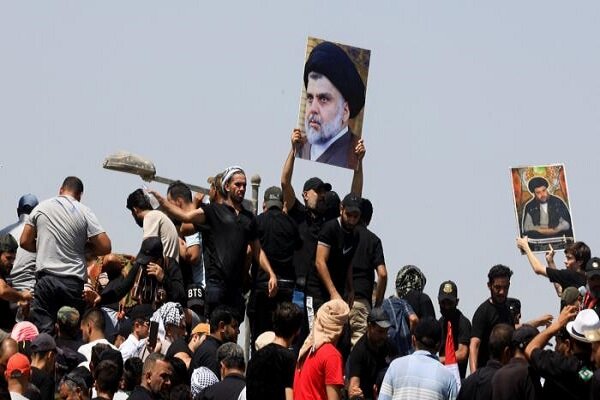Before analyzing the issue, it is necessary to mention that the United States was the “main loser” of the 2021 Iraqi parliamentary elections. From months before the elections, the White House was looking for “suspension” or “sanction” and otherwise, “influencing the outcome of the election” by using various political, security and media tools. But with the efforts and resistance of the Iraqis and various political groups, the elections were held and the US-backed list won only 9 seats in the parliament! As many leading figures whose connections with the US are evident, failed to win a seat in the parliament.
On the other hand, the representatives of the Shiite parties in favor of the Islamic discourse and the Resistance Front, including the Sadris, were the “big winners” of the election. In total, the Shiite movements were able to occupy 179 seats in the parliament (equivalent to 52 percent); a result that did not have a good message for the United States! The US is “wounded” by the 2021 Iraqi parliamentary elections, and since then, it has been using every opportunity to “revenge” the Shiite movements, even Moqtada Sadr himself.
There is no doubt that Moqtada Sadr belongs to the noble, rooted, mujahid and anti-arrogant family of Sadr. The Sadr family, including Moqtada, are considered to be “unique activists” of Iraq’s internal developments, who have worked for Iraq’s “national interests” at various times and have sacrificed great martyrs in this way.
Today, Iraq is in a “very sensitive” situation and “vigilance” is necessary to pass this dangerous stage. Moqtada Sadr is expected to be careful enough not to be “abused” by the internal and external enemies of the Iraqi nation. Some regional and international activists and internal elements against the unity, stability and prosperity of the Iraqi nation are planning to plunge this country into a swamp of “complex and long-term crises” in the name of Moqtada Sadr and under the cover of the actions of his supporters.
The events of recent weeks have shown that Sadr leads a movement that does not have enough “supervision” over it, and despite having a significant supporter population, does not have a realistic approach that is in line with Iraq’s national interests. Therefore, various people from Baathist elements to the leftists, nationalists and even Takfiris can easily “infiltrate” the ranks of this movement and shout their demands in the name of Sadr and add to the tension of the situation in Iraq.
Street weighing is not the only solution to get out of Iraq’s political deadlock, but it will also have an adverse effect on the role and political influence of Sadr in the political future of Iraq. This issue has increased people’s skepticism towards this Iraqi Shiite cleric and as a result, his political position will decline.
Giving priority to the “national interests” of Iraq and acting on its basis in the field of decision-making as well as in speeches and statements is an important issue that can solve a major part of the current problems and take away the opportunity for any adventure and incitement and intensification of political and factional divisions from the enemy.
The unfavorable political and field atmosphere that has emerged in Iraq in recent weeks, if it is not stopped or controlled at some point, it will facilitate and accelerate the progress of “American plans and programs” in Iraq. If until a few years ago, the Americans sought to shape the Shiite-Sunni conflicts in Iraq, today fueling the “Shiite-Shiite conflicts” is at the top of the plans of the United States and its allies.
The polarization of the Iraqi society, the threats caused by the activation of silent ISIS cells, the expansion of the playing field of the United States and other destructive regional players as well as terrorist groups in Iraq, the spread of intra-Shiite differences, the increase in the risk of military conflict between the armed forces affiliated to the two Shiite factions of Sadr and the Coordination Framework and as a result of the intensification of the current political impasse, are the most important negative consequences of continuation of the current situation in Iraq, which, if not managed or controlled, may face the country with a new round of security, social, economic and so on crises.
The results of recent developments in the Iraqi society show that, with the exception of Sadr’s movement, other Shiite and even non-Shiite movements are ready to play their role in defending the political structure without creating tension and increasing challenges, with political rationality and vote stability, as well as by insisting on legal and civilian solutions, including dialogue.
The aforementioned movements, including the Coordination Framework, which include an important and influential part of the Iraqi society and won significant seats in the recent parliamentary elections, today, like the time of the ISIS crisis, look at the Shiite authority in Najaf and dislike any street camping.
The political climate of Iraq is as such that the favorable progress of affairs and the formation of an efficient government require the interaction, participation and cooperation of all effective and caring political movements in Iraq. Taking political radicalism, totalitarianism, unilateralism and ignoring the demands of other political parties and movements in Iraq has always had the opposite result.
The Complexities and the Necessity of Confronting ISIS-Khorasan
Strategic Council Online – Note: With the rise of the Taliban in Afghanistan, the issue of ISIS-Khorasan, the conflict between these two groups, and the expansion of the scope of their security threats in the region have become more critical than ever before, as the terrorist activities of this terrorist group disrupt regional security. In addition to this, support for suicide activities and armed individuals in the region has also put the security of Iran at risk. Therefore, ISIS-Khorasan is recognized as a significant threat to the eastern security of our country.
Dr. Hossein Ebrahimnia – Regional Issues Expert










0 Comments